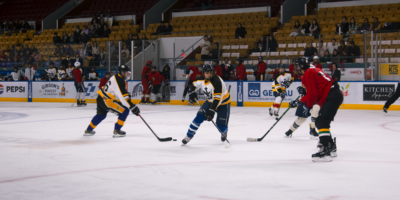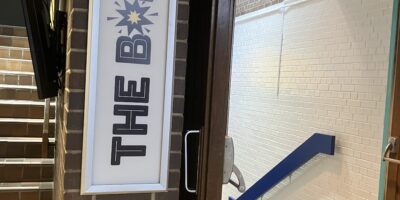What’s up readers? Welcome to my fourth issue of The Iron Warrior as editor. I had my doubts about this one, but we got it done in the end. Production of this paper was largely fueled by Bryan’s delicious marshmallow squares, the recipe for which you can find in Half-Baked this issue. This issue actually has some of the best articles we’ve had this term. I want to give a big shout out to everyone who made that possible.
Please excuse the lack of an overall theme for this editorial. For a while I honestly just wanted to make it a 1700 word walk-through for The Legend of Zelda: The Wind Waker, my favourite videogame.
People often say that if you find a job you love you’ll never work a day in your life. A lot of people equate this to something a little out there, like reviewing pizza in Chicago as a full time job or being the camera-person at the Air Canada Center for the Leafs (which are both completely legitimate career choices), but it can also apply to things that we do right here at the University of Waterloo. I didn’t enjoy the work that I did at my first two co-op positions. The terms were good, I learned a lot and I regard them as time well spent, but I couldn’t see myself working in a manufacturing environment forever. My third co-op term I spent doing mechanical design, which I greatly enjoyed. I had a terrific mentor and I learned an incredible amount about design, but I couldn’t see myself working there forever. The scope of the projects was too small. My most recent co-op term was where I started working with robotics, and really fell into my own.
Should I have gone into Mechatronics Engineering? Probably. Should I have paid attention during that prof hour when they explained the Mechatronics option to us? Definitely, but I didn’t. So my introduction to industrial robotics came a little late, but was still very welcome. Working with and learning about different types of arms was an awesome experience. Co-op experiences show you what you want to do and where you want to live, but also what you don’t want to do. Before I came to Waterloo my grandfather was convinced I was going to end up running an automotive parts plant someday, and that seemed like a reasonable possibility. Now though, it seems almost impossible.
That brings me back to my point though. I didn’t mind working at my last co-op. Some of the tasks that got passed to me weren’t quite as enjoyable as others, but on the whole I enjoyed getting to work in the morning and settling for a day of robot-related stuff. I was always asking questions of the more experienced engineers, and trying to fill my brain with as much as possible in four months. I’m returning to the same position in the summer and I’m beyond excited about it. If you find a job you love you’ll never work a day in your life. Sure, working for Loudwire magazine reviewing the newest heavy metal albums all day would be pretty amazing (I’m hyped up for Mastodon’s new album at the end of this month), but robots are cool too.
Alright, on to my next topic: interview skills. I take a very relaxed approach to interviewing. This works out sometimes, and sometimes it doesn’t. I think I mentioned in an earlier editorial this term that I look at interviews as just regular conversations, which in a sense they are. Interviewers are just regular people like you and I. Sure, they might have 30+ years of experience at this company and they might even be the founder of the company, but they’re still people. Conversing with people is starting to become a lost art form; today we instant-message people so often that direct human contact intimidates us.
First of all sit up straight in your chair. This might seem like a silly thing to start with but it really makes a difference. If you sit up to your full height in your chair your posture will be better and you’ll seem more confident. You’re going to start slouching after a minute or two, so try and catch yourself. Interviews aren’t time for relaxing. Continuing down the same vein is body language. I’m constantly tapping my fingers or toes, but try not to during interviews. This habit makes you appear fidgety or bored, which is something you need to actively avoid during an interview. Hand placement is also important. Wringing your hands is also as bad as constantly tapping them. To combat both of these I started taking notes during interviews in second year, which is something I’m going to come back to in a minute. Having something to hold in your hands helps combat fidgeting and taking notes will help keep you engaged throughout the interview.
Moving upward, I want to talk about what to do with your face during an interview. Smiling goes a long way. It makes you seem more approachable and will actually change the tone of your voice a little bit. A full Heath Ledger-style Joker grin isn’t the best idea though, just a little smile. Looking eager in a job interview is never really a bad thing. Eye contact is also very important. You can use eye contact to really drive a point home near the end of an interview, or to show that you are actively listening to the interviewer. Be careful not to get too intense with the eye contact though, as finding yourself in a starting contest can be a little unnerving.
Too many interviewers think that it’s their job to outline every single detail of the job in the first half of the interview, which isn’t very productive for you. When this happens I try to cut them off as early as I can, and actually have a conversation. Don’t be rude about this, just try to relate that you have read the job description and know what the position entails. I have literally asked for the “Coles’ Notes” of the position before instead of all the details. By spending more time talking about what you bring to the position you can make a lasting impression and separate yourself from the pack.
Now, on to what to actually do during an interview: talking is the most important part. You need to have an active conversation with the interviewer, and explain to them why you are THE best fit for the position. I’ve gotten positions which I haven’t been the most experienced or qualified for, and I’m almost positive it was because I did a better job of expressing myself. Talk about the required skills that the employer listed, highlighting the ones you already possess, and talk about the ones that you know you can acquire. Try to make a personal connection with the interviewer. I spent about five minutes during one interview talking about my hockey and softball teams, trading anecdotes with the interviewer who would go on to become my supervisor, and eventually my friend.
I also want to come back to my notes. It seems like everyone has one of those University of Waterloo clipboards, so put it to work. I usually print out a copy of the resume I used to apply to the position (I have a system for customizing my resume for every position I apply to, but that’s a different story) so that I remember exactly what it says. I also print out the job posting, and highlight items that I think might be important. This is the page I make notes on. I write down anything that they tell me about the actual position, as well as my impression of the interviewer(s). Once the interview is over I even rate the position out of five stars at the top of the page. Once rankings come out I use these notes and my rating to determine whether or not I really want the job.
I want to end this editorial with a small anecdote. I wish I had a video of one interview I did last term, to show people how much of a difference body language can make. The position was working in a research laboratory in Ottawa – I don’t remember which one – and the posting made it seem like the position involved research into high tech polymers. As the interview went along though it became clear that the position was more or less just about running tests and data collection, so I asked if it was more or less a lab assistant position. I was hoping for an answer like “No, you’ll be doing a variety of research tasks,” but they said “Yes, it’s more or less an assistant position.” I felt my posture crumple and my eyes glaze over. I wasn’t going back to being a lab assistant at this point in my university career. At the end of the interview when they asked if I had any questions, which I pretty much always do, I flat out said no and left as quickly as I could. One out of five stars.
So yeah, that does it for me this issue. If you want to holla at me for any reason, you can write me at iwarrior@uwaterloo.ca. You stay classy San Diego.




Leave a Reply